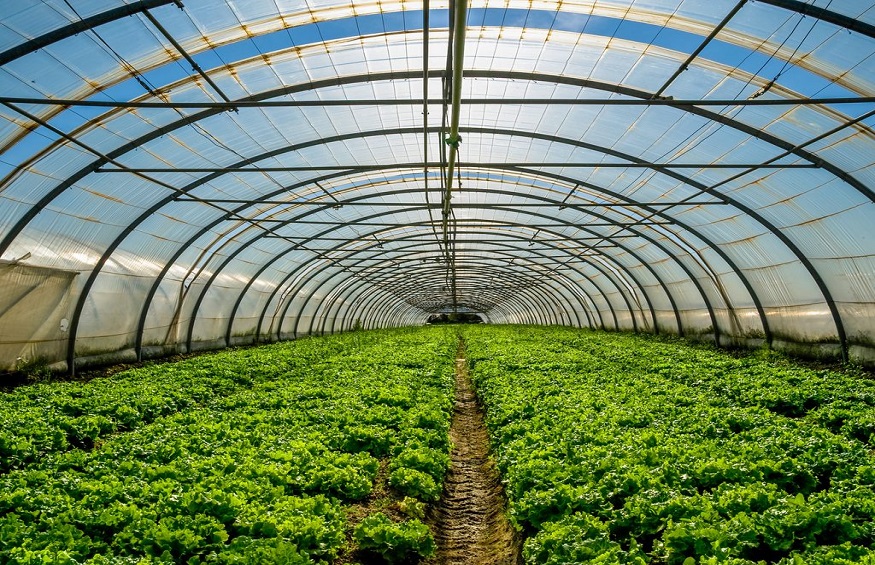Polyhouse farming is a practice which is still not much popular in Indian agriculture even though it provides more returns to the farmers. Different parameters are controllable inside a polyhouse by which farmers can maximize the crop yield. Protected farming practice like polyhouse farming proves to be profitable, especially in places where the conditions are not suitable for growing crops with conventional agriculture methods.
We are witnessing that Indian farmers are steadily moving forward to adopt the new technologies and techniques of modern crop production. Today, we will also focus on changes that polyhouse farming has made in the agriculture sector, and why farmers should raise different crops in a polyhouse?

What is Polyhouse Farming?
Often, people tangle the word ‘polyhouse’ and ‘greenhouse’ together, both the structures are for crop production under controlled environment but the building materials used are different in both. Polyhouse has the idea of affordability behind it while the greenhouse is expensive, but it has high durability comparatively.
Polyhouse farming majorly practised by the vegetable and flower growers. The structure of a polyhouse is of metal, and the polythene used as the roof covering material. The polythene acts as a barrier for the radiation and gases inside which regulates the temperature of the polyhouse.
How It Changes the Way of Crop Production?
Polyhouse farming is an unconventional technique of crop production but undoubtedly a more precise and profitable one. From seed sowing to the harvest, everything happens inside the polyhouse by providing optimum growth conditions.
Conventional farming practices are not suitable in today’s environment and will not be sufficient for future food demands. Problems such as pest attack, weed invasion, fungal or bacterial diseases lead to immense economic losses to the farmers, especially to marginal farmers. Polyhouse farming can be the solution to all these problems. A protected environment is what a plant needs for better growth, which ultimately results in high-quality yield and better returns.
Another major problem for farmers is crop irrigation, and it becomes even more challenging for those from low rainfall or drought regions. Setting up a micro-irrigation system inside a polyhouse saves 70 % to 80 % of irrigation water.
In the places of high altitude and cold climate, Polyhouse farming is becoming popular as it can successfully grow those crops which are not easy to grow in cold climatic conditions. Proper management and monitoring of crops inside a polyhouse can increase the yield significantly.
Benefits of Raising Crops in a Polyhouse
Lesser Dependency on Climate:
By controlling parameters like temperature, humidity, soil moisture, and sunlight, a polyhouse reduces the dependency of the crop on the external climatic conditions. It allows farmers to grow their crop off-season when the demand is relatively higher. Polyhouse farming protects the crop from frost, wind, heavy rainfall, and other external damaging factors.
Farmers Can Grow Vertical:
Polyhouse farming can provide 3-4 times higher yield when the farmers utilize the vertical space of the polyhouse. There are crops such as tomato, cucumber, and other vegetable or fruit crops which can grow vertical when provided support. Growing crops vertically can generate much higher income by utilizing the farm area effectively.
Faster and Better Growth:
Polyhouse farming precisely and effectively provides the optimum conditions for crop development and growth. Plants grow faster because they get all the essential nutrients required, adequate soil moisture, optimum temperature, and irrigation when it is needed.
The primary objective of polyhouse farming is quality and quantity harvest, which is possible with proper management and care of the plants according to their specific requirements during the different growth stages.
In the modern world, the food demand is increasing exponentially, and traditional farming practices may not be able to fulfil this huge demand in future. The central and state governments launched various schemes to promote agripreneurship in the country by providing subsidies for protected farming projects like polyhouse farming.
Polyhouse farming has the potential to create better food production system in urban as well as in rural areas. Low cost and easy maintenance of polyhouse make polyhouse farming, a considerable choice for those farmers who want to grow more with the same area of land they own. With support from the government institutions, farmers are now more encouraged towards polyhouse farming.






Leave a Reply
You must be logged in to post a comment.